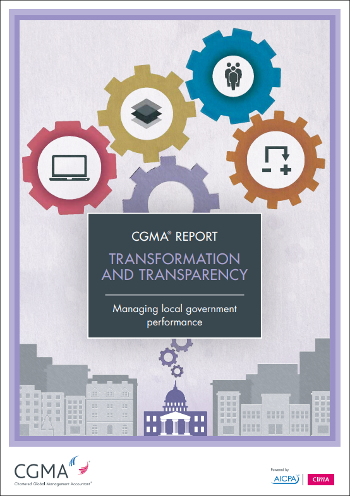Ungated Post | 05 Jan 2015
Transformation and Transparency: Managing local government performance

Surveying local government leaders worldwide, Oxford Economics, CIMA, and AICPA looked at the evolving role finance is playing in helping government leaders address key performance management challenges. While more than two-thirds of local governments are undergoing or have recently completed organizational transformations, they are struggling with realizing the full potential new technologies may play in these transformations.
The paper also found that disconnects exist between what businesses need and what local governments provide. Close collaboration between business and governments is crucial, and it’s clear a breakdown currently exists between the two in many areas. But by paying close attention to the “Four Ts” of local government performance—transformation, technology, transparency, and talent—sustainable success and effective performance management can be achieved.
Click here to read the full report.
Oxford Economics’ team is expert at applying advanced economic tools that provide valuable insights into today’s most pressing business, financial, and policy issues.
To find out more about our capabilities, contact:
Americas
Diantha Redd
+1 (646) 503 3052
Email
Asia Pacific
Peter Suomi
+65 6850 0110
Email
EMEA
Aoife Pearson
+44 (0)203 910 8054
Email
Related Services

Post
The economic impact of abandoning the WTO
Oxford Economics have been commissioned by the International Chamber of Commerce (ICC) to provide an independent assessment of the economic impact of WTO dissolution. This report details our findings and the assumptions underpinning our analysis.
Find Out More
Post
The economic impact of the sports activities of public service media
This study shows how the sports activities of public service media supported €4.5 billion of GDP and 57,000 jobs across 31 European countries in 2022. The report also highlights wider economic benefits of public service media sports coverage, such as the way in which it leverages sponsorship income for sports bodies.
Find Out More
Post
Global Trade Education: The role of private philanthropy
Global trade can amplify economic development and poverty alleviation. Capable leaders are required to put in place enabling conditions for trade, but currently these skills are underprovided in developing countries. For philanthropists, investing in trade leadership talent through graduate-level scholarships is an opportunity to make meaningful contributions that can multiply and sustain global economic development.
Find Out More